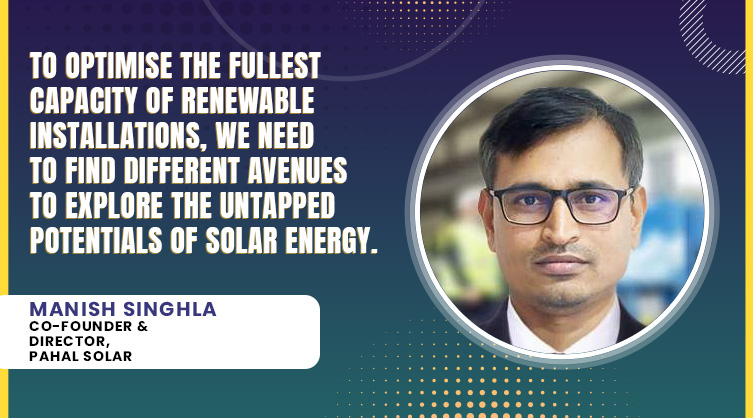Regulatory initiatives for RE is creating a paradigm shift in solar EPC business
By EPR Magazine Editorial April 26, 2023 6:52 pm IST
By EPR Magazine Editorial April 26, 2023 6:52 pm IST

Realising the full potential of solar energy generation and installation will help the EPC business address land availability and cost competitiveness issues, says Manish Singhla, Co-Founder and Director of Pahal Solar.
What policy and regulatory changes have affected the solar EPC industry in India in recent years, and what impact have they had?
For the residential sector, the net-metering policy with energy set-off on the billing cycle and subsidy has resulted in huge demand, benefiting many EPC players.
A similar net-metering policy with energy set-off on the billing cycle for non-demand-based LT consumers is attractive. The energy set-off between 7:00 am to 6:00 pm is a setback for LT demand-based and HT consumers. The industry is now getting ready to invest or find financing options for solar installations to reduce their monthly electricity bill. However, this policy makes it impossible.
The open access policy is also creating buzz for HT consumers for their captive consumption; however, the daily set-off time of 11 hours again results in hesitation. The Kusum scheme, especially the Kusum-C tender, which is closed on March 24, 2023, has a great degree of expectation among the EPC players.
India, being a tropical country, has abundant solar energy. Are there areas where we need to explore the untapped potential of solar energy?
Having abundant solar energy is a great treasure to cherish. Once energy storage becomes more economical, the national highways can be an attractive area to cover them with solar installations and create charging stations along the sides with modular battery solutions that can be replaced like gas cylinders.
We have a huge wasteland; a special focus in this area with easier norms for land lease can become a great option to explore for untapped potential solar energy.
How are EPC companies addressing land availability issues and grid connectivity for solar power plants?For EPC companies, this is the biggest show-stopper. It is always tough to manage the combination of the two, as in some cases, when there is land availability at a reasonable price, there is not enough capacity left in the nearest substation, and in other cases, if there is capacity left in the nearest substation, either there is no land available, or it is costly, making the project unviable. To solve these puzzles, EPC companies must keep looking for options to solve both issues.
What challenges do solar EPC companies face regarding project financing, and how are they overcoming them?
There is a great degree of awareness, and now the industry is considering solar installation as one of the best and easiest cost-cutting options. However, hesitations from the bank financing without a mortgage are a challenge that is being overcome slowly as some banks started proposing green-energy loans with lesser security. In addition, there are non-banking financing companies providing loans with very little security.
What role do government incentives and subsidies play in the growth of the solar EPC industry in India, and how sustainable are these incentives in the long term?
Gujarat’s subsidies for solar roofs for the residential sector have created a wave, resulting in more than 700 fully functional EPC companies, one of the biggest impacts the policy with subsidies can make.
A similar paradigm shift was anticipated with the help of the national portal, which has yet to happen so far; however, some changes in the policy will certainly create a similar national-wide shift. The subsidy is a mindset that can help create special interest for consumers; however, as more and more residential consumers adopt solar options, the subsidy will ultimately not be necessary, and the industry will become self-sustaining.
We use cookies to personalize your experience. By continuing to visit this website you agree to our Terms & Conditions, Privacy Policy and Cookie Policy.